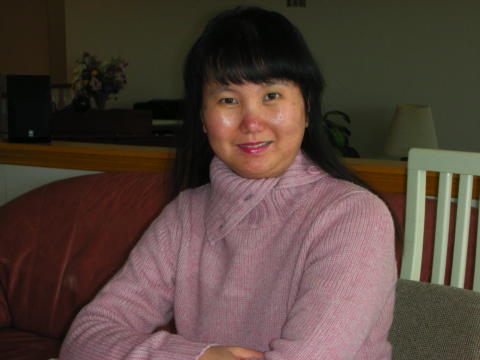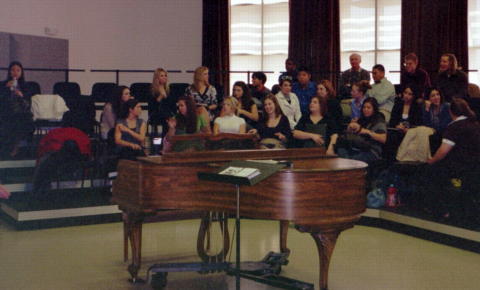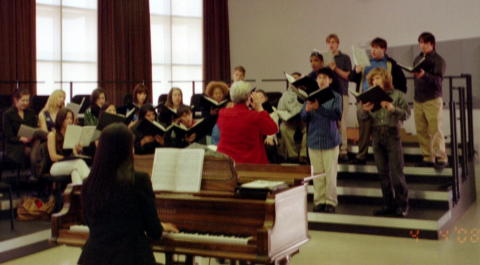|
MUSIC LESSONS

CLEO HUANG describes the unusual way
in which music helped her
to cope with her life
My mother sat down at the dinner table with a frown on her face one evening when I six years old. She had met my first-grade teacher at my school in Taipei, Taiwan, that afternoon. 'I was so embarrassed,' she told my father, her Chinese words tumbling over each other in consternation. 'Do you know what Teacher Ghe revealed to me? She said that every time they cross paths, our daughter looks away, pretending not to see her coming!'
Since before I could remember, Mom and Dad have taught me the importance of making perfect impressions on everyone outside our household. It was the only way to prevent bringing shame to the family. But in trying to ward off mistakes by avoiding my teacher, I'd only caused my parents more reason to despair. In other situations, they warned, bad people who sensed our faults and weaknesses could also use that information to harm us.

Cleo Huang
|
Mom sternly ordered me never to stray from instructions given by my elders. Being so young, I lacked the experience to make accurate judgments. Taking my own initiative on any endeavor could only bring unimaginable danger.
I was to tag on the title of 'uncle', 'auntie', or 'mama' to the names of all acquaintances in my parents' generation as a show of respect -- whether or not these people were actually related to us. This was much more complicated than it sounds, especially to a six-year-old. There were at least two different terms for 'aunty' and no less than three for 'uncle', depending on whether the relation is with one's father or mother, and on their ages, with respect to the ages of one's own parents. Rather than risking a mistake, I tried my best to avoid all such interactions, often by hiding in my bedroom whenever anyone came over.
Imagine the trauma that I experienced after immigrating to the United States at age seven. Seeing an easy target, classmates seized every opportunity to taunt me relentlessly. The prim-and-proper clothes that Mom dressed me in, the favor my teachers showed me for my obedience and academic excellence. The glasses that I started wearing when an eye exam revealed I was nearsighted. The Asian accent in my English, and my awkwardness with phrasing and word usage when talking.
I took comfort in the awards that I earned, and the compliments that my teachers doled out. I taped certificates recognizing my academic achievements to the walls of my bedroom until hardly a scrap of wallpaper remained visible. On top of my bookshelf, I displayed the trophies I won from piano and violin competitions I'd entered. Plaques for top honors from my weekend Chinese school lined another cabinet.
Oh, but what I longed for was a different type of approval -- one that provided security through understanding. I read novels about friends who respected one another based upon who they were on the inside, not on the achievements they could make. When these people were nowhere to be found in my own life, I concluded that I must lack something that all normal kids were born with.
I suddenly lost it all. Unexplained problems with my vision and hearing, coupled by severe headaches and bouts of vomiting, eventually led to the devastating diagnosis of a malignant brain tumor. At age fourteen, I underwent major brain surgery that removed most of the tumor, but inflicted permanent damage to my short-term memory and muscle control over the left side of my body. Post-surgical radiation and chemotherapy treatments further impaired the function of my lungs, my sense of balance, and my visual perceptions.
Through intense physical, occupational, and speech therapy, I relearned to walk, use my left arm, and speak coherently. But difficulties with piecing together, organizing, and retaining new information continued to plague me. My physical balance and coordination also gave me trouble, and the mistakes triggered by all of these impairments traumatized me.
My parents only made matters worse. They tried to shame me into working harder by despairing every imperfection they saw in my movements, and expressing contempt at every glitch in my memory. People in general would find me repulsive, they insisted, and continue to do so, until I recovered every bit of the abilities I'd lost.
By the time I graduated from high school, my self-esteem had sunk to an all-time low. The entire month before I first moved onto campus at Loyola Marymount University, Mom and Dad inundated me with directions on how to dress, what to say, what to do, and ways to respond to possible questions posed by professors and classmates. I was not to give others any opportunity to take advantage of my weaknesses, nor to wonder about the kind of parents who would so neglect raising their daughter properly.
I was a nervous wreck by time classes actually started. I retained almost nothing of my first few days on campus. Mom exacerbated the matter by stopping in every weekend to inspect my dorm room, gripe about my roommates' habits, and claim that they were taking unfair advantage of my sweet nature.

Members of the LMU choruses on tour in northern California during an informal exchange with the choir at San Francisco's St Ignatius High School
|
Then I stepped into my first rehearsal with the LMU Concert Choir. Its reputation as one of the top university choirs in the country was intimidating, to say the least. I assumed that such a professional group would be able to sing all of its pieces just as they were written, and pull its performances together without much effort. I'd last two weeks, I calculated, before they let me go. I geared myself up for the disappointment, hoping that it wouldn't hurt as much if I expected it.
I was in for a shock. At rehearsals, voice parts were interchanged to adapt to the particular nature of the singers' voices. Notes, chords, and short passages were rewritten, even while we rehearsed, to smooth out rough spots. The standing positions of each singer were adjusted to craft the right blend of sound when projected toward the audience. The pronunciation of both vowels and consonants were altered for articulation and for shaping the musical lines more effectively. When singing in different buildings, further adjustments were made to accommodate the distinct resonance of sound within each structure.
'We have to do whatever it takes, behind the scenes, to make our sound as perfect as possible out there, where our audiences are sitting,' our conductor told us. 'They have no idea of what we do in rehearsals to craft our resulting sound -- and they don't care. What makes us great, in their eyes, is the final product that we present to them.
'Look around you!' Dr Breden ordered. 'Be aware of the singers standing close by, and make adjustments to create the right blend of sound. Hold up your scores, so that you can see me peripherally while you sing. Do what you need to do, as an individual, to contribute to what we want to accomplish as a whole.
'Draw some connections to your own lives. Would you be successful if you always did what other people told you to do, and never bothered to fit them into your particular situation? Taking that initiative is what distinguishes an intelligent person from the rest of the crowd. You are the one responsible for your circumstances, just as you are responsible for the music that we make.'
An exhilaration I'd never felt before streamed through me. Over time, I learned to break my problems into smaller parts and find practical solutions to overcome them. When reading, I linked information together by meaning, then retyped them onto adjacent lines -- the way we juxtaposed similarly shaped musical passages as we learned them at choir rehearsals. I put my mistakes into context by stepping back, analyzing them from a distance, and focusing on how they fit into circumstances surrounding the incident -- the way our conductor stepped off her podium to view the choir in its entirety from the opposite end of the concert hall before each performance.
Instead of directing attention to my weak left leg while walking, I shifted it to finding a balance from the center of my body -- the way we balanced the higher and lower voices while singing. And, when my parents finally allowed me to learn to drive, I condensed and rewrote all driving directions, taping them to a corner of my windshield so that I could see them peripherally while keeping my eyes on the road -- the way we were instructed to hold up our music scores to keep our conductor's gestures in our peripheral vision as we sang.
I felt a drastic improvement in my ability to process new information, which only enhanced my self-esteem. I gained control over my emotions by viewing new experiences in terms of their proper contexts, instead of fitting them into established standards. I taught myself to focus on finding solutions to each problem, rather than on despairing what had already gone wrong. Over time, I analyzed all of my perceptions, and came up with ways, specific to each situation, to tackle every trial that I encountered.

Members of the LMU choruses on tour in northern California during an informal exchange with the choir at San Francisco's St Ignatius High School
|
Since then, my future no longer seems hopeless, and the challenges that still loom, no longer insurmountable. I continue to sing as an alumna with the Concert Choir at LMU, and it still provides tremendous strength and inspiration.
Copyright © 14 March 2009 Cleo Huang, California USA
 A CLASSICAL MUSIC MISCELLANY
A CLASSICAL MUSIC MISCELLANY
| 
